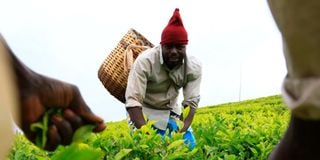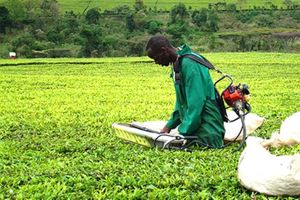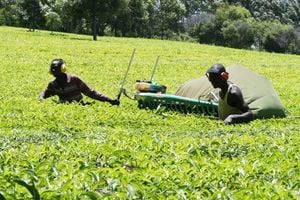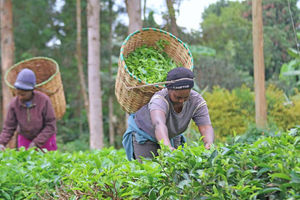
A farmer plucking tea. Some 620,000 small scale tea farmers lost over Sh600 million in dubious transactions by top officials at the Kenya Tea Development Agency.
Some 620,000 small scale tea farmers lost over Sh600 million in dubious transactions by top officials at the Kenya Tea Development Agency (KTDA), an audit report presented to President William Ruto has revealed.
Another Sh3 billion meant to pay farmers their dividends went down in two commercial banks that have since collapsed, the report added.
The 130-page confidential report that revealed the well-orchestrated and massive plunder of farmers’ cash was handed over to President Ruto at State House, Nairobi, two weeks ago during a meeting with the current directors of KTDA.
The President is understood to have demanded action on the report. Deputy President Rigathi Gachagua is leading reforms on tea and coffee after years of farmers’ complaints about cartels ripping them off.
The audit has recommended, among other things, the prosecution of some former KTDA directors and senior staff and the tracing of assets bought using the money looted from farmers.
Financial impropriety
The “Inspection Report of Kenya Tea Development Agency”, outlined how farmers have been impoverished by KTDA officials who even went to the point of using farmers’ cash for personal benefit.
Former President Uhuru Kenyatta directed the inquiry into the financial activities at KTDA through Executive order No 3 of 2021. At the time, KTDA was faced by leadership wrangles and claims of financial impropriety.
The Nation has obtained a copy of the classified document, which has been kept under lock and key at the AG’s office and which lays bare the rot at KTDA, including cases of tax evasion and breach of financial regulations.
“Arising from the notable conflict of interest, some directors and senior managers were found to be culpable and should be surcharged or prosecuted as appropriate,” the report recommended.

The report has also outlined 12 issues that the government needs to urgently deal with as it undertakes tea reforms in the country.
These include lack of financial transparency at KTDA, trade between KTDA and some countries that have no formal banking systems, malpractice at the tea auction in Mombasa and non-compliance with tax obligations.
The report has also recommended that the government look into irregular land purchases and exaggerated legal fees which have been cited as part of a wider scheme to embezzle farmers’ cash.
The report says the failure by KTDA directors to conduct due diligence in land purchases saw farmers lose Sh542 million in dubious land deals.
In one such land transaction, the former administration purchased 50 acres of land in Nyandarua at an inflated price. In this transaction, the board approved the purchase of the land at Sh39,984,000, translating to Sh800,000 per acre.
The audit pointed that there was a valuation report indicating that the land had been valued at Sh750,000 per acre.
In yet another dubious transaction, KTDA bought land for the purpose of planting trees which would be used at the tea factories. This land was identified as Laikipia /Nyahururu 12607. In this transaction, the eight hectares of land were bought at Sh15,515,600.
Wood fuel plantation
This is despite a report by the KTDA forest officer indicating that the land was not suitable for establishment of a wood fuel plantation.
As such the audit has recommended that the Ethics and Anti-Corruption Commission (EACC) as well as the Directorate of Criminal Investigations (DCI commence investigations on all parcels of land and establish the amount of cash lost in the dealings. There are also questions about some Sh2.3 billion spent on power plants and hundreds of millions of shillings owed by foreign firms that bought Kenyan tea. The debts have, however, not been listed in KTDA’s official financial statements.
Following this wanton looting, the audit has recommended the prosecution of directors and senior managers for the offence of theft by servant. “Investigate elements of fraud perpetrated by KTDA directors and senior management, raising need to pursue recovery proceedings for the money lost on behalf of tea factories by the asset recovery authority,” the audit said in part.
The investigation further revealed that another Sh101 million of farmers’ money was lost through overpayment to lawyers appointed to represent KTDA in court.
Some prominent lawyers have been identified as part of this elaborate syndicate where some of the money paid to the lawyers was traced back to the accounts of top officials of KTDA.
During the meeting with the President in April, the current directors of KTDA impressed on the Head of State to order the full implementation of the inspection report.
The report was first handed over to the government on July 9, 2021, but no action was taken until two weeks ago when the current KTDA officials revived the matter.
Mr Wilson Njenga, a former senior staff at the Office of the of the President, and Mr Arthur Osiya, who were joint chairs of the inspection team, had handed over the report to then Attorney General Paul Kihara in July 2021.
The two said there was a need for major reforms in the tea sector if farmers are to benefit from their sweat.
The investigations team included officers from 10 state departments.
Mr Gachagua, who has been spearheading tea and coffee reforms, has been holding a series of meeting with the top leadership of KTDA, with the last meeting being held on April 25 at the DP’s official residence in Karen.
Ms Wanjiku Wakogi, the Chief of Staff at Mr Gachagua’s office, said in a letter to KTDA chairman Enos Njue that the meeting was a follow-up of earlier meetings.
In the letter dated April 19, 2024, Ms Wakogi said the agenda of the meeting was to discuss the upcoming countrywide elections of tea officials.

A woman picks tea in Rwatheini, Nyeri County
She also highlighted some of the contentious issues that had been pending in court.
In the letter, she said that as part of government efforts to implement the Tea Act, it had been agreed that former directors should withdraw all cases that they had lodged in court challenging their ouster from office.
Allowed to contest
Also agreed on was that present and former directors would be allowed to contest during the upcoming elections scheduled for August 16.
It is during this meeting that consensus was reached on some of the issues that have been a subject of intense fights between the current board of directors and the ousted team.
At the DCI headquarters, investigators from the Economic Crimes Unit have been dispatched to Mombasa to record statements on the activities at the tea auction.
The team , which is headed by a chief inspector of police, has been at the coast where they have recorded statements and obtained documents on the volumes of tea that have been shipped out of the country in the last three years.
A senior official at the DCI told the Nation that this fresh investigation had been triggered by the State House meeting. Calls by the Nation to DCI boss Mohammed Amin on the status of investigations went unanswered.
The audit also faulted KTDA for trading with some countries that have been slapped with international sanctions. The audit said these countries have challenges in making payments since they have issues with their banking systems.
Between 2015 and 2020, tea worth Sh488 million was exported to these countries despite the challenges.
Out of this colossal amount, one country was yet to pay Sh194.5 million as at August 2020.
“Such sales may be omitted from financial statements therefore understating their revenues and thus underpaying farmers. This confirms there are no clear mechanisms of debt recovery,” the audit said.
The audit recommends that further investigations should be conducted to ensure that all money received is property accounted for and that KTDA should also liaise with the Ministry of Foreign Affairs before engaging in business with some of the sanctioned countries.
In yet another spectacular case of wastage, farmers lost over Sh2 billion in a power project initiated by the former board.
A total of Sh4.8 billion, was invested in four power production companies as part of a strategy to lower the cost of power at the tea factories. These four power companies—Chania, Metumi, Gura and Imenti—have been operating at less than 60 percent of their capacity.
The auditors noted that these projects had been over-designed and costs overestimated, leading to the loss of Sh2.3 billion that would have been paid out to farmers as dividends.
The audit has now recommended, among other things, the reassessment of the power projects for efficient operations and also prosecution of individuals named as persons of interest in varying the designs of the project.
Two former senior staffers of KTDA have been identified as persons of interest in this scheme.











